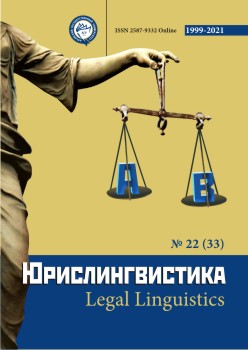Cash Benefits in Social Welfare: Transformation of Legislation and Scientific Approaches to the Definition of Employed Concepts
Abstract
The article analyzes the shortcomings of the conceptual apparatus characteristic of the right for social security in designating the types of social security provided in monetary form. In particular, there is a lack of necessary definitions (including key concepts such as "benefits" and "compensation"); lack of uniformity of terms (foregoing, the term "compensation" in some sources is used in the sense of "reimbursement of costs incurred by a person", traditional for the science of labor law, and in others a "civilized" approach to compensation as payments aimed at restoring the property sphere in case of encroachments on intangible goods is applied); "doubling" of concepts (for example, the appearance of "insurance payments" along with insurance "benefits"). Based on the analysis of the current legislation, it is concluded that there is no consistent distinction between the concepts of "benefits", "compensation", and other monetary payments. Nevertheless, a retrospective analysis of the sources of social security law, as well as ideas and approaches formed in science (not without the influence of the science of labor law), allows us to define certain types of social security payments. Unfortunately, they are not always reflected in the legislation on social security, as a result of which the scientific ideas themselves are undergoing changes, in particular, the criteria determining the essence of various social security payments are being enough. It seems that the directions for improving the system of sources of social security law should be the rejection of excessive terminological diversity in determining the types of social security, as well as the orientation to the approaches developed in science to their definition.Thus, it is proposed to use the category of benefits as a universal concept, referring to it social security payments in cash, which do not have specific features of other social security payments.
Downloads
Metrics
References
Адриановская Т.Л. Компенсации в праве социального обеспечения и в трудовом праве / Социальное и пенсионное право. – 2014. – № 4. – С. 27-30.
Андреев В.С. Право социального обеспечения в СССР : учебник. – М., 1974.
Антипьева Н.В. Единство и дифференциация правового регулирования как принцип социального обеспечения / Вестник Пермского университета. Юридические науки. – 2013. – №3 (21). – С. 8-16.
Антонова Н.В., Еремина О.Ю., Каменская С.В. и др. Институт социальных пособий и компенсаций в Российской Федерации: генезис правового регулирования : научно-практическое пособие. – М., 2021.
Григорьев И.В. Право социального обеспечения : учебник и практикум для вузов – М., 2021.
Гусева Т.С. Использование российским законодателем новой терминологии для обозначения социальных выплат: объективная необходимость или недостаток юридической техники / Вестник Пермского университета. Юридические науки. – 2011. – № 1. – С. 126-132.
Гусева Т.С. Правовая природа компенсационных выплат в праве социального обеспечения России / Социальное и пенсионное право. – 2011. – № 3. – С. 11-13.
Евстигнеева Л.А. Принципы права социального обеспечения: в преддверии кодификации / Вестник Томского государственного университета. Право. – 2015. – №2 (16). – С. 138-144.
Краснова С.А. Проявления компенсационного воздействия в гражданском праве и праве социального обеспечения: сравнительно-правовой анализ / Проблемы правового обеспечения безопасности личности, общества и государства : сборник статей всероссийской научно-практической конференции. – Новосибирск, 2019. С. 103-109.
Кручек И.В. О месте компенсаций в праве социального обеспечения в контексте проблемы формирования понятийного аппарата законодательства о социальном обеспечении / Таврический научный обозреватель. – 2016. – № 8-1 (13). – С. 11-18.
Лушников А.М. Становление и развитие учения о принципах трудового права и принципах права социального обеспечения / Вестник трудового права и права социального обеспечения. – 2014. – Вып. 8. – С. 7-25.
Маматказин И.Р. Юридические конструкции компенсационных правоотношений / Актуальные проблемы российского права. – 2014. – № 2. – С. 212-217.
Мачульская Е.Е. Право социального обеспечения : учебник для вузов.– М., 2021.
Миронова Т.К. Новации в понятийном аппарате права социального обеспечения и их влияние на предмет отрасли / Актуальные проблемы российского права. – 2017. – № 9(82). – С. 153-162.
Право социального обеспечения : учебник и практикум для вузов / под ред. М.В. Филипповой. – М., 2021.
Право социального обеспечения : учебник для академического бакалавриата: в 2 т. / под ред. Ю. П. Орловского.– М., 2019. Том 2. Особенная и специальная части.
Прасолова И.А., Кашлакова А.С., Киселева Е.В. и др. Право социального обеспечения : учебное пособие. – Барнаул, 2019.
Смирнова Н.Л. Пособия по временной нетрудоспособности как вид страхового обеспечения по праву социального обеспечения современной России: дис. … канд. юрид. наук. – Владивосток, 2002.
Цветков С. Б. Право социального обеспечения : учебное пособие. – Волгоград, 2009.
Copyright (c) 2021 Юлия Михайленко

This work is licensed under a Creative Commons Attribution 4.0 International License.
The authors, which are published in this journal, agree to the following conditions:
1. Authors retain the copyright to the work and transfer to the journal the right of the first publication along with the work, at the same time licensing it under the terms of the Creative Commons Attribution License, which allows others to distribute this work with the obligatory indication of the authorship of this work and a link to the original publication in this journal .
2. The authors retain the right to enter into separate, additional contractual agreements for the non-exclusive distribution of the version of the work published by this journal (for example, to place it in the university depository or to publish it in a book), with reference to the original publication in this journal.
3. Authors are allowed to post their work on the Internet (for example, in a university repository or on their personal website) before and during the review process of this journal, as this may lead to a productive discussion, as well as more links to this published work (See The Effect of Open Access).











